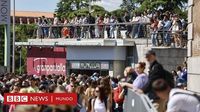Spain and Portugal faced a massive power outage on April 28, 2025, that left millions without electricity and caused widespread disruption across both countries. The blackout, which began shortly after noon local time, affected transport, communications, and essential services, prompting emergency meetings at the highest levels of government.
According to Red Eléctrica, Spain's electricity operator, the outage impacted the entire Iberian Peninsula, with the exception of the Balearic Islands and the autonomous cities of Ceuta and Melilla. The outage also briefly affected parts of southern France. By late afternoon, power began to return in certain areas, including parts of Catalonia, Aragon, the Basque Country, Galicia, Asturias, Navarra, Castilla y León, Extremadura, and Andalusia.
Pedro Sánchez, the President of the Spanish Government, addressed the nation, stating, "The causes are still being studied, and we anticipate critical hours ahead." He urged citizens to minimize travel and conserve mobile phone usage to avoid overwhelming the networks.
In Madrid, the mayor, José Luis Martínez-Almeida Navasqüés, reported that traffic lights were non-operational, leading to severe congestion. He advised residents to stay home unless absolutely necessary. "It was like a jungle out there," said Luis Ibáñez Jiménez, a driver caught in the chaos. "I had to accelerate to get past a huge bus that came out of nowhere."
The Madrid Metro system was entirely shut down due to the outage, with parts of the network evacuated as services were suspended. Many commuters found themselves stranded, and the Administrator of Railway Infrastructures (ADIF) confirmed that train services were also interrupted, with passengers waiting inside trains for the situation to improve.
Airports in Spain were operating under contingency measures, although delays were reported. Aena, the state-owned airport operator, advised travelers to check with airlines regarding flight statuses. In Portugal, TAP Air Portugal recommended that passengers avoid heading to the airport until further notice. Reports emerged of hundreds of people waiting in the dark at Lisbon's Humberto Delgado Airport, with shops only accepting cash as electronic payment systems were down.
As the blackout continued, supermarkets in both countries saw long lines as people rushed to stock up on essentials. Many shoppers expressed concern over how long the outage would last, with one butcher, Oliver Ortiz, stating, "We're buying non-perishables just in case. We don't know how long this will go on."
Spain's Ministry of Health assured that hospitals had backup power systems in place, and the National Institute of Medical Emergencies (INEM) in Portugal activated contingency plans to maintain operations. However, numerous rescues were carried out by firefighters in Madrid, who responded to elevator emergencies across the city.
By the evening, reports indicated that approximately 35% of the population in Andalusia had regained power, with Endesa, the electric company, restoring supply to about 3.5 million customers. The Spanish government declared a state of emergency in affected regions, allowing for a coordinated response to the crisis.
Meanwhile, the impact of the blackout extended to sporting events, with the Mutua Madrid Open tennis tournament suspended as players were forced to leave the court mid-match due to the outage.
Authorities in Portugal indicated that the outage was likely caused by a failure in the Spanish electricity network, with the Portuguese network operator REN noting unusual atmospheric conditions that may have led to the power cut. Antonio Costa, the President of the European Council, confirmed that there were no indications of a cyberattack.
In a show of solidarity, Ukraine offered energy assistance to Spain, Portugal, and France, with the Minister of Foreign Affairs, Andri Sibiha, stating, "We are ready to help restore stable operations of energy networks in Europe." Morocco also connected its electricity grid with Spain to help restore power in affected regions.
As the situation developed, the Spanish government continued to work on restoring full electricity supply and managing the crisis. Many citizens remained anxious as they awaited updates on the restoration of services and the investigation into the causes of this unprecedented blackout.
With the situation still evolving, officials urged the public to remain calm and rely on official channels for information as they worked tirelessly to resolve the crisis. The blackout on April 28, 2025, stands as one of the most significant electrical failures in Spain's history, affecting nearly the entire population of the Iberian Peninsula.






